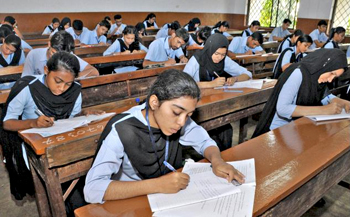Bengaluru, Mar 23: The re-examination for students of second year PU chemistry paper that was leaked, will be held on March 29 between 9 am and 12:15 pm.

Rathnakar, however, ruled out re-examination for II?PU?mathematics paper, which students had complained was tough. He said the questions were in conformity with NCERT?syllabus adopted by the PU?board. Opposition members said rumours were rife that most of the II?PU?exam question papers this year had leaked.
The Malleswaram police, who had started a probe following a complaint by DPUE?on Monday night, said the leaked paper was circulated probably on WhatsApp and by email. Probe into the source of these messages would help in tracing those responsible for the leak.”
Aditya, a student waiting outside the PU department's office from 1 pm to 6.30 pm, said: “We want the re-examination to be cancelled. Why should I and other students be punished for the incompetence of the PU board. It is their responsibility to ensure that there are no leaks.”
Another protesting student spoke in the same vein. "We studied very hard and wrote the exam; these people do not have any concern for us. We do not want a re-exam,” he declared. If at all a re-exam is held, it should be for the Mathematics paper, he added. “There were 35 to 37 questions from outside the syllabus and it will impact the results in a big way,” he noted.
K N Ranganath, joint director (examinations), DPUE said: “Only a few students will be benefitted if a re-exam is not conducted. This would be an injustice to majority of the students. I am aware that students will suffer but this is required.”




Comments
It is really demoralizing students who really burns their midnight oil and who prepared for exams. Government should use latest technology to prepare and safeguard the question papers till the last minutes.
It is impossible to leak the question paper without the help of PU board staff. Government should investigate this leak and punish guilty at the earliest with severe punishment to deter others in future.
finally, re-exam should not be more tough than earlier one as pupils have already exhausted preparing for one of the important milestone in their educational life. At least a little liberal evaluation will do more justice majority of the students who honestly wrote their first exams.
Add new comment